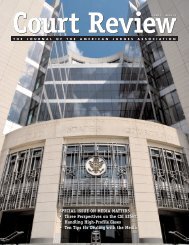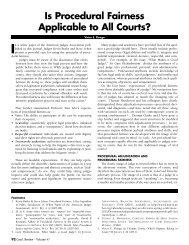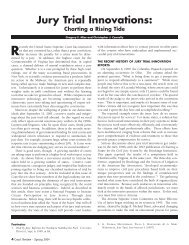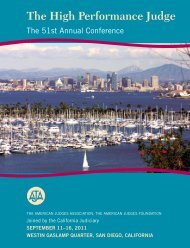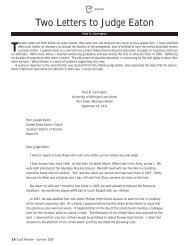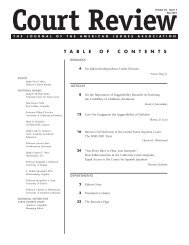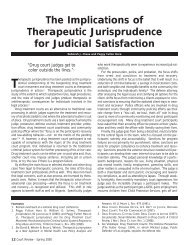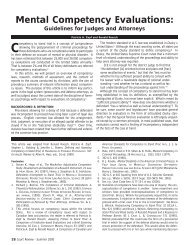Special Issue on Procedural Fairness - American Judges Association
Special Issue on Procedural Fairness - American Judges Association
Special Issue on Procedural Fairness - American Judges Association
- No tags were found...
Create successful ePaper yourself
Turn your PDF publications into a flip-book with our unique Google optimized e-Paper software.
3. Judicial educati<strong>on</strong> must include—for lack of a better term—“leadership” development. Programs likethe Leadership Institute in Judicial Educati<strong>on</strong> at the University of Memphis help participating judgesto understand themselves better, as well as how others learn and change. Such programs teach therole of emoti<strong>on</strong>s in those processes in ways that can be useful in educating others, in judging, and inlife. <strong>Judges</strong> need h<strong>on</strong>est feedback in a safe envir<strong>on</strong>ment in order to build self-awareness and c<strong>on</strong>tinueto develop as leaders in their courtrooms.4. Judicial educators need to train judicial mentors. The habits and values judges adopt within the first24 m<strong>on</strong>ths are likely to be the <strong>on</strong>es they keep throughout their careers. Effective mentoring is a keyin shaping this.WHAT CAN COURT LEADERS DO?1. The <strong>American</strong> <strong>Judges</strong> Associati<strong>on</strong> encourages the C<strong>on</strong>ference of Chief Justices to place the issue ofprocedural fairness in state courts <strong>on</strong> their agenda during 2008. Each state Chief Justice has enormousinfluence <strong>on</strong> the agenda for justice in their state. Collectively the C<strong>on</strong>ference of Chief Justicescan set the agenda for our nati<strong>on</strong>’s state courts. It may at first glance seem presumptuous for the<strong>American</strong> <strong>Judges</strong> Associati<strong>on</strong> to encourage the C<strong>on</strong>ference to place this issue <strong>on</strong> their agenda in 2008.Many states already are deeply committed to improving the procedural fairness of their courts, andmany individual Chief Justices are champi<strong>on</strong>s of this issue. But the performance of our courts <strong>on</strong>matters of procedural fairness has certainly not been perfected, which is why the C<strong>on</strong>ference of ChiefJustices should place this issue <strong>on</strong> their agenda.2. Similarly, the <strong>American</strong> <strong>Judges</strong> Associati<strong>on</strong> encourages the C<strong>on</strong>ference of State Court Administratorsto place the issue of procedural fairness <strong>on</strong> their agenda during 2008. We acknowledge the leadershipof COSCA in developing excellent white papers to guide future acti<strong>on</strong>; we have modeled ourwhite-paper process <strong>on</strong> COSCA’s excellent efforts. State-court administrators have been the traditi<strong>on</strong>alchampi<strong>on</strong>s of improved case management. The new mantra of court administrati<strong>on</strong> should bethat effective case management that also affords procedural fairness to litigants is the essence of effectivecourt administrati<strong>on</strong>. Unless both goals are achieved, the system of justice will flounder.3. The <strong>American</strong> <strong>Judges</strong> Associati<strong>on</strong> encourages courts to examine the Nati<strong>on</strong>al Center for State Courts’CourTools. Our goal is to have at least 100 additi<strong>on</strong>al courts adopt and implement the CourTool <strong>on</strong>access and fairness in 2008.4. The <strong>American</strong> <strong>Judges</strong> Associati<strong>on</strong> invites the courts community to plan for a nati<strong>on</strong>al c<strong>on</strong>ference <strong>on</strong>procedural fairness in 2009. The Nati<strong>on</strong>al Center for State Courts, the Nati<strong>on</strong>al Judicial College, theCenter for Court Innovati<strong>on</strong>, the Institute for the Reform of the <strong>American</strong> Legal System, Justice atStake, and the <strong>American</strong> Judicature Society all have tried to improve the fairness of our courts. Ifthese organizati<strong>on</strong> and others were willing to partner with the <strong>American</strong> <strong>Judges</strong> Associati<strong>on</strong> to planand seek funding for a nati<strong>on</strong>al c<strong>on</strong>ference <strong>on</strong> procedural fairness, the issue of fairness in our courtscould be advanced exp<strong>on</strong>entially.5. The <strong>American</strong> <strong>Judges</strong> Associati<strong>on</strong> encourages bar-associati<strong>on</strong> leaders to join with the courts to ensuregreater procedural fairness in our courts. Lawyers need to be educated <strong>on</strong> the social-science researchdescribed in this paper so that all of the players within the court system can work together toward ajustice system that can be respected by all.6. The <strong>American</strong> <strong>Judges</strong> Associati<strong>on</strong> encourages the Urban Court Manager Network, working with theCourt Review - Volume 44 21



